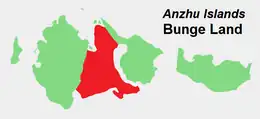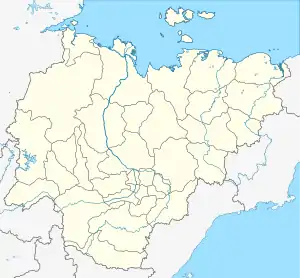 Location of Bunge Land in the Anzhu subgroup. | |
 Bunge Land | |
| Etymology | Alexander Alexandrovich Bunge |
|---|---|
| Geography | |
| Location | East Siberian Sea |
| Coordinates | 75°25′07″N 141°00′49″E / 75.41861°N 141.01361°E |
| Archipelago | New Siberian Islands |
| Area | 6,200 km2 (2,400 sq mi) |
| Highest elevation | 8 m (26 ft) |
| Administration | |
Russia | |
| Republic | Yakutia |
| Demographics | |
| Population | 0 |
| Ethnic groups | None |
Bunge Land or Zemlya Bunge is a huge empty and almost barren intermediate zone in the Anzhu Islands north of Siberia. It is located between Kotelny and Faddeyevsky, which, unlike Bunge Land, could be described as proper islands. Sandy and flat, its area is 6,200 km².
Since most of its surface rises only to a maximum height of 8 m above sea level, Bunge Land is flooded during storm surges, except for a very small area in the southeast that rises to an elevation of 11 to 21 m above sea level. The area that is periodically submerged accounts for over 80% of the total surface and is practically devoid of vegetation.[1]
Bunge Land is named after Russian zoologist and explorer Alexander Alexandrovich Bunge.[1][2]
References
- 1 2 Kropotkin, Peter (1911). . In Chisholm, Hugh (ed.). Encyclopædia Britannica. Vol. 19 (11th ed.). Cambridge University Press. p. 536.
- ↑ Бунге земля, Great Soviet Encyclopedia
This article is issued from Wikipedia. The text is licensed under Creative Commons - Attribution - Sharealike. Additional terms may apply for the media files.